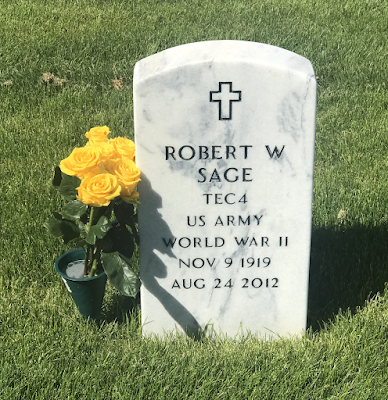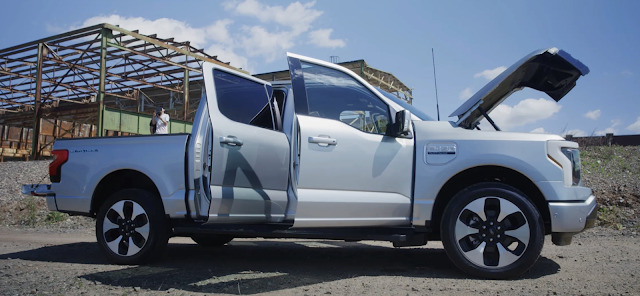My father served in World War II in the Third Army. He survived, lived a long life, married and had three children.
 |
| Robert Sage, on surrendered rifles, 1945 |
Our regimental headquarters was located near there, but to get from our position at the airport required an intricate routing. My instructions were:“Drive across this field to the autobahn.You’ll see four German soldiers’ bodies at the best point for climbing up the side. You have to go up fast or you’ll high center at the top. Drive on the autobahn until you come to a break, which you won’t be able to cross. Drive down the bank. Again, start off fast or you’ll high center. Cross the field to the unpaved road. Turn right and follow it. Don’t take any roads leading off to the left. That area has not yet been taken. Eventually you’ll get there.”
I had made the trip once in daylight, when Sergeant Major Jones called me to battalion headquarters. It was about ten o’clock at night. General Culin and his son had come in on an airplane and wanted to be taken to regimental headquarters. Since I was the only person who had made the trip, I was given this honor. “Could headlights be used?” It was decided they could be.
General Culin got into the front seat beside me. His son, a lieutenant, got in the rear seat. The route I would have to take had been somewhat frightening to me, even in the daylight. Now, with a general, I wondered if I might be court marshaled for endangering his life. I pointed out the bodies of the German soldiers to the general and explained that it would be necessary to go up the side fast.
He understood. “Just do as you normally would do.”
“How long have those bodies been there?” his son, the lieutenant, asked.
“I don’t know, sir,” I answered.
The three-mile trip on the autobahn went quickly, as I worried about the drive over the side. It came quickly. I would have to do it. The rear axle scraped and the rear wheels lost traction. Had I been too cautious? I held my breath. Yes, it was okay. We were moving down the bank, and a road came into view in the headlights. There was enough light to see without headlights and we were now in the area that I had been told was just two miles from enemy territory. I turned off the lights and drove slowly.
Where were those two dead horses that had told me I was on the right road? I continued on. Still no dead horses.
Then I passed a large building. I hadn’t remembered any large building. I pulled to a stop.
“What’s the problem, Corporal?” the general asked.
“We should have come to two dead horses in the road. I want to be sure we haven’t taken a wrong road.” I walked back to the building. A sliver of light was coming from a small window some distance above the
ground. I pulled myself up by the ledge and peeked in. It was a large room and seemed to be filled with people. I listened. They were speaking in a language I couldn’t identify. Were they locked in? Could it be I was now behind enemy lines?
I walked back to the jeep. The general and his son were out of the jeep and under a canvas on the ground. A light shining around the edges told me they were probably studying a map. I walked on ahead. In a short
distance I came to the dead horses. I rushed back to the general to tell him the good news.
We continued on.
“Damn.”
“What’s wrong?” the general asked.
“We have a flat tire. I’ll need to put on a spare.” I started to work. A soldier appeared in the darkness, a regimental headquarters guard. Yes, we were only a short distance from our destination. He would walk the general and lieutenant to it.
Before leaving, the general asked, “Tell me, Corporal. How long have you been doing this?”
“Since we went into combat in the Saar, sir.”
“Always alone?”
“Yes, sir.”
“No more, Corporal,” he said emphatically.
The next day written orders came out that mounted messengers were to work in pairs. Most battalions had already been doing this, but Sgt. Major Jones needed an order to get him to be reasonable. Paul Rega, a nineteen-year-old from LaGrange, Illinois, became my companion, and Philip Ridinger, a spunky young replacement who had been working in battalion headquarters, now had been assigned to work with Corporal Montgomery.
--- --- --- ---
Robert Sage came home. Had wife pregnant with a son--me--, a daughter age two, and a later son, David.
He had a career, starting as a teacher at Jackson School in the Medford School District.
































